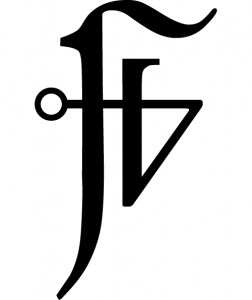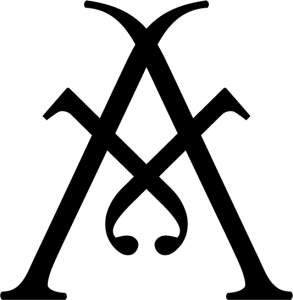Craft Notes
ON THE LITERARY DETERRITORIALIZATION OF THE OCCULT
MAGICK IS SUCH my jam it’s the best. To intervene, to sculpt the forces in motion that lie ever behind all phenomena – I really don’t know how to work any other way. Even tho I suck at math, I’m pretty boss at jimmying an algorithm, noticing how the hidden variables shift and float. Numbers are less important than access to archetypes, gods as guides dropping this or that for us to notice, signposts and gestures, fleeting affinities that when frozen stand as nexus-objects multi-dimensional we can intuit beyond boundary. With the Will, that’s us – burning variable altering environment by manipulating the living furniture in the hidden room behind.
 The letter word the sign is never not a sigil. Given, there are greater and lesser degrees of involvement. Sometimes the immobility of the intent is monolithic and plinth-like, entirely discernible, or else it’s more about the splitting/rejoining of a designated grammar, terms or characters as place-holders for the energies contained therein, their recombinant effect resulting in whatever transcendent endgame is necessary to render organs null and of a single glowing body.
The letter word the sign is never not a sigil. Given, there are greater and lesser degrees of involvement. Sometimes the immobility of the intent is monolithic and plinth-like, entirely discernible, or else it’s more about the splitting/rejoining of a designated grammar, terms or characters as place-holders for the energies contained therein, their recombinant effect resulting in whatever transcendent endgame is necessary to render organs null and of a single glowing body.
Expression bunches and twists the only fabric, tears through veils, the silence, so that we might recalibrate, effect a given change, order what we know as Chaos and the rest of it.
One thing I’ve noticed is that literary writing by self-identifying occultists is often quite bad, even as (or because) it demonstrates its principles. On the other hand, literary writers who’re interested in the dynamics of occult philosophy and practice have generally produced exciting work.
The best example, my go-to guy, is Henri Michaux. More adept at watching his own imagination than any other artist I can think of, he explored inner worlds, wrote exorcisms, and all the time revealed his process. The most memorable piece in this vein is a malediction called “I AM ROWING”:
…
Your mouth bites you
Your nails scratch you
No longer yours, your wife
No longer yours, your brother
The sole of his foot bitten by an angry snake
Someone has slobbered on your descendants
Someone has slobbered on the laugh of your little girl
Someone has walked slobbering past the face of your domain
The world moves away from you
I am rowing
I am rowing
I am rowing against your life
I am rowing
I split into countless rowers
To row more strongly against you
You fall into blurriness
You are out of breath
You get tired before the slightest effort
I row
I row
I row
…
How metal is that? I mean, c’mon. He also wrote at least one benediction, but one of the best things about Michaux was the scientific distance he was able to apply toward his own negativity. Useful, for certain.
The litany is one of the most common magickal technologies in writing. Repetition on any level, really, though the oratorical immediacy of the same thing written written spoken spoken creates a certain hammering, battering-ram effectiveness that assures the author’s will breaks through the medium.
The list, too, its individual components secondary to the spell created by the whole. The order of its parts, which are chanted even when not read aloud, make the commonplace something oracular.
Chance operations and bibliomantic appropriation have been standard procedure for the generation of a certain type of work for who knows how long. That reading/writing is necromancy by definition seems worth considering. Coffined thoughts, disembodied voices being freed talismanically from their bound sarcophagi.
No matter the case, works that make the writing about the magick that the writing does seem natural in a time of such transparency. Away from the altar and into the streets. The alchemical project of Ariana Reines’ MERCURY, the instruction/rituals of CA Conrad’s A BEAUTIFUL MARSUPIAL AFTERNOON, and, in a similar vein, Yoko Ono’s GRAPEFRUIT all leap immediately to mind as partaking of that tradition.
 The underlying importance of magickal engagement, in writing or otherwise, seems to stem less from craft in itself and more from devotional practice. To see writing as an act of theurgy is also to experience the world(s) opened up by the act as very real, traversable and holy zones in which both the creator and reader-as-creator encounter de/re-constitution and rise in transports of joy. It hardly matters whether these spaces are cthonic, celestial or both. Barbarous tongues, secret names, endless chambers, entities inhabiting multiple forms and speaking polyglot language. No matter how menacing, no matter how seemingly indecipherable the speech of beings encountered in the space unfolding, the openness required to walk through those spaces and discover what there is to be taught requires a kind of control in refusing to tame or over-shape its mystery. This would dull the glow of the Love we need to live that goads to make its life our own and also everything.
The underlying importance of magickal engagement, in writing or otherwise, seems to stem less from craft in itself and more from devotional practice. To see writing as an act of theurgy is also to experience the world(s) opened up by the act as very real, traversable and holy zones in which both the creator and reader-as-creator encounter de/re-constitution and rise in transports of joy. It hardly matters whether these spaces are cthonic, celestial or both. Barbarous tongues, secret names, endless chambers, entities inhabiting multiple forms and speaking polyglot language. No matter how menacing, no matter how seemingly indecipherable the speech of beings encountered in the space unfolding, the openness required to walk through those spaces and discover what there is to be taught requires a kind of control in refusing to tame or over-shape its mystery. This would dull the glow of the Love we need to live that goads to make its life our own and also everything.
[ Glyphs by Tyann Prentice. http://www.pententacles.com]
Tags: Ariana Reines, henri michaux, occult

Oh, man. I love this. What I really want to do when I write is to write scripture.
G, you are snoring in my apartment as I am writing this. I’m trying to contact you in your dreams. What does my avatar look like? What is Chaos and the rest of it?